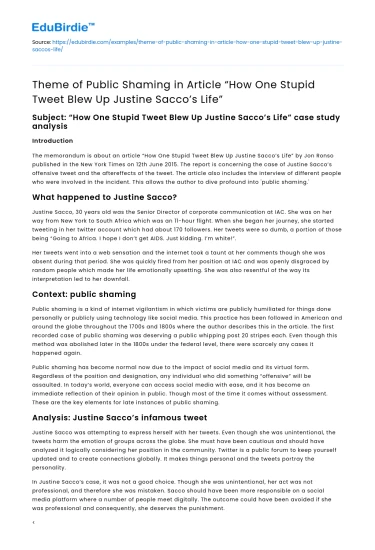Subject: “How One Stupid Tweet Blew Up Justine Sacco’s Life” case study analysis
Introduction
The memorandum is about an article “How One Stupid Tweet Blew Up Justine Sacco’s Life” by Jon Ronso published in the New York Times on 12th June 2015. The report is concerning the case of Justine Sacco’s offensive tweet and the aftereffects of the tweet. The article also includes the interview of different people who were involved in the incident. This allows the author to dive profound into 'public shaming.'
What happened to Justine Sacco?
Justine Sacco, 30 years old was the Senior Director of corporate communication at IAC. She was on her way from New York to South Africa which was an 11-hour flight. When she began her journey, she started tweeting in her twitter account which had about 170 followers. Her tweets were so dumb, a portion of those being “Going to Africa. I hope I don’t get AIDS. Just kidding. I’m white!”.
Save your time!
We can take care of your essay
- Proper editing and formatting
- Free revision, title page, and bibliography
- Flexible prices and money-back guarantee
Her tweets went into a web sensation and the internet took a taunt at her comments though she was absent during that period. She was quickly fired from her position at IAC and was openly disgraced by random people which made her life emotionally upsetting. She was also resentful of the way its interpretation led to her downfall.
Context: public shaming
Public shaming is a kind of internet vigilantism in which victims are publicly humiliated for things done personally or publicly using technology like social media. This practice has been followed in American and around the globe throughout the 1700s and 1800s where the author describes this in the article. The first recorded case of public shaming was deserving a public whipping post 20 stripes each. Even though this method was abolished later in the 1800s under the federal level, there were scarcely any cases it happened again.
Public shaming has become normal now due to the impact of social media and its virtual form. Regardless of the position and designation, any individual who did something “offensive” will be assaulted. In today’s world, everyone can access social media with ease, and it has become an immediate reflection of their opinion in public. Though most of the time it comes without assessment. These are the key elements for late instances of public shaming.
Analysis: Justine Sacco’s infamous tweet
Justine Sacco was attempting to express herself with her tweets. Even though she was unintentional, the tweets harm the emotion of groups across the globe. She must have been cautious and should have analyzed it logically considering her position in the community. Twitter is a public forum to keep yourself updated and to create connections globally. It makes things personal and the tweets portray the personality.
In Justine Sacco’s case, it was not a good choice. Though she was unintentional, her act was not professional, and therefore she was mistaken. Sacco should have been more responsible on a social media platform where a number of people meet digitally. The outcome could have been avoided if she was professional and consequently, she deserves the punishment.
Recommendations
In today’s digital world, social media has become a significant part of the way people in most walks of life communicate.
- Professionalism: We should always maintain a courteous a professional image, even on personal media. What we do in personal life can affect professional life too.
- Respect for others: We should respect humanity and should always have mutual respect. It is essential to review the comment before posting it on the social media platform. Providing a multi-dimensional view to the comment and analyzing is the key here.
- Integrity: Maintaining high standards of honesty when communicating online plays a crucial role. Any information provided online should be accurate, current and easy to understand.
Therefore, it is our responsibility to provide high-grade thoughts and opinions to the society. The usage of social media should be in a positive way and each and every comment we post should be analyzed and reviewed before posting.






 Stuck on your essay?
Stuck on your essay?

